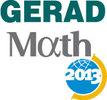HEC Montréal, Canada, May 6 - 8, 2013
2013 Optimization Days
HEC Montréal, Canada, 6 — 8 May 2013
OPDE 2013
This fourth OPDE network conference falls under the previous editions (Paris, 2006; Québec, 2008; Montpellier, 2010). The network success and the social demands still reveal the high interest for the “decide together” question across various problematics more or less specialized depending of the research field. These problematics question the nature of tools as well as the related use as for instance: elaboration, implementation and assessment phase of the decision processes. This is thus a transversal issue which allows sharing knowledge and practices from different scientific communities like the diversity of researchers joined together proves it. This plurality of approaches answers well the need to consider group decision from a wide perspective which constitutes a key principle whatever the OPDE conference.
Program of the conference OPDE 2013
The format of the conference is designed to encourage participation in both events. Thus, the plenary sessions are always accessible to everyone, without overlapping schedules. The preliminary program will be available on our website in early April 2013.
The OPDE 2013 opening plenary session will be held on Monday afternoon, by
Fred S. Roberts, DIMACS, Rutgers University, USA, USA, and will be entitled “The Tradeoff between Security and Commerce in Urban Areas”.
Furthermore, the conferences proposed through OPDE will be held in two parallel sessions between Monday afternoon (May 6) and Wednesday morning (May 8).
The OPDE 2013 concluding plenary session , in the late morning of Wednesday, May 8, will propose a tutorial given by Vincent Mousseau, École Centrale Paris, France, and will be entitled “Outils d'élicitation des préférences pour l'aide multicritère: application et mise en pratique en utilisant la plateforme Decision Deck”.
The conferences will either be in French or English. Abstracts and presentations can be made either in one or the other of these two languages.

